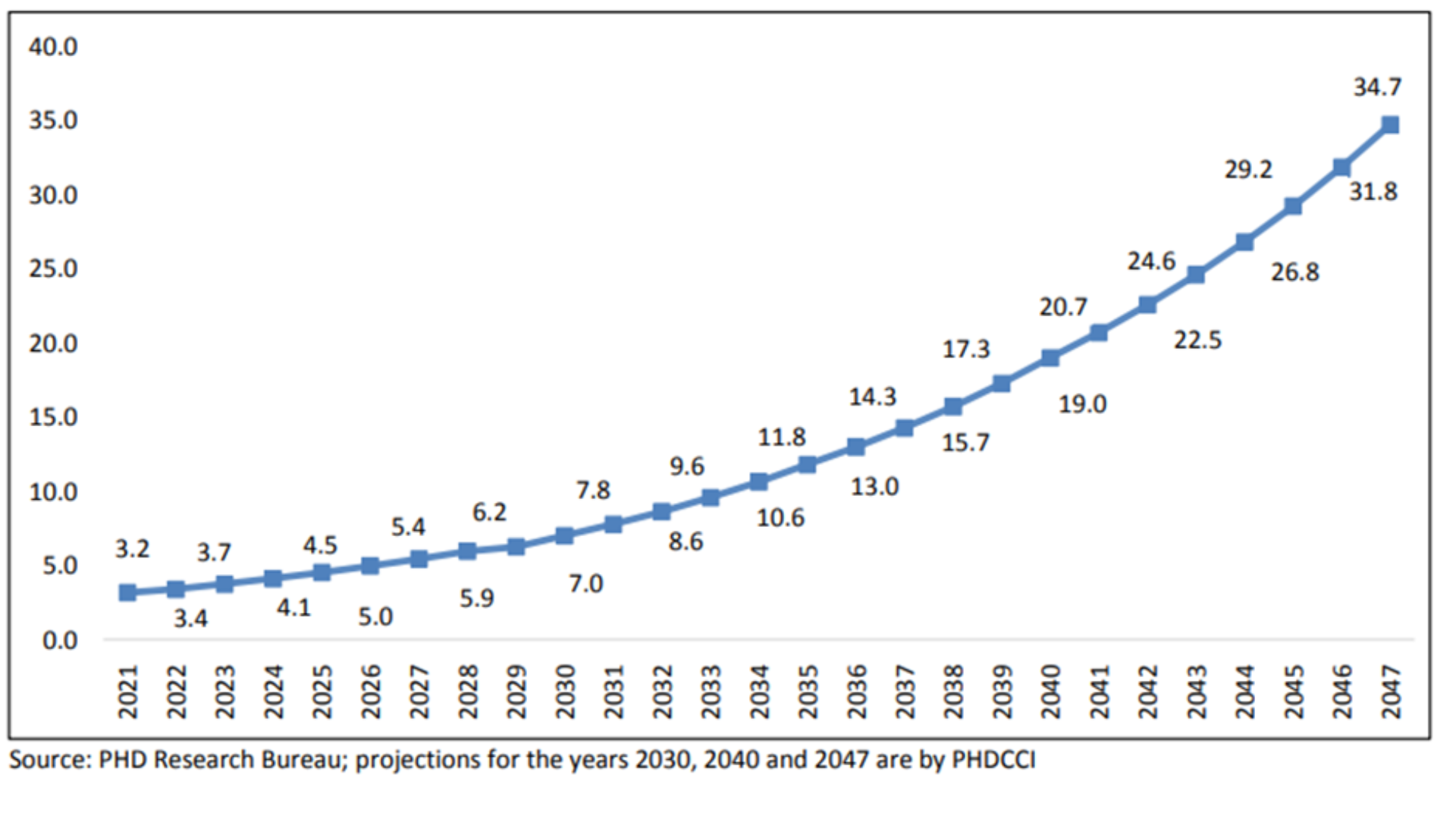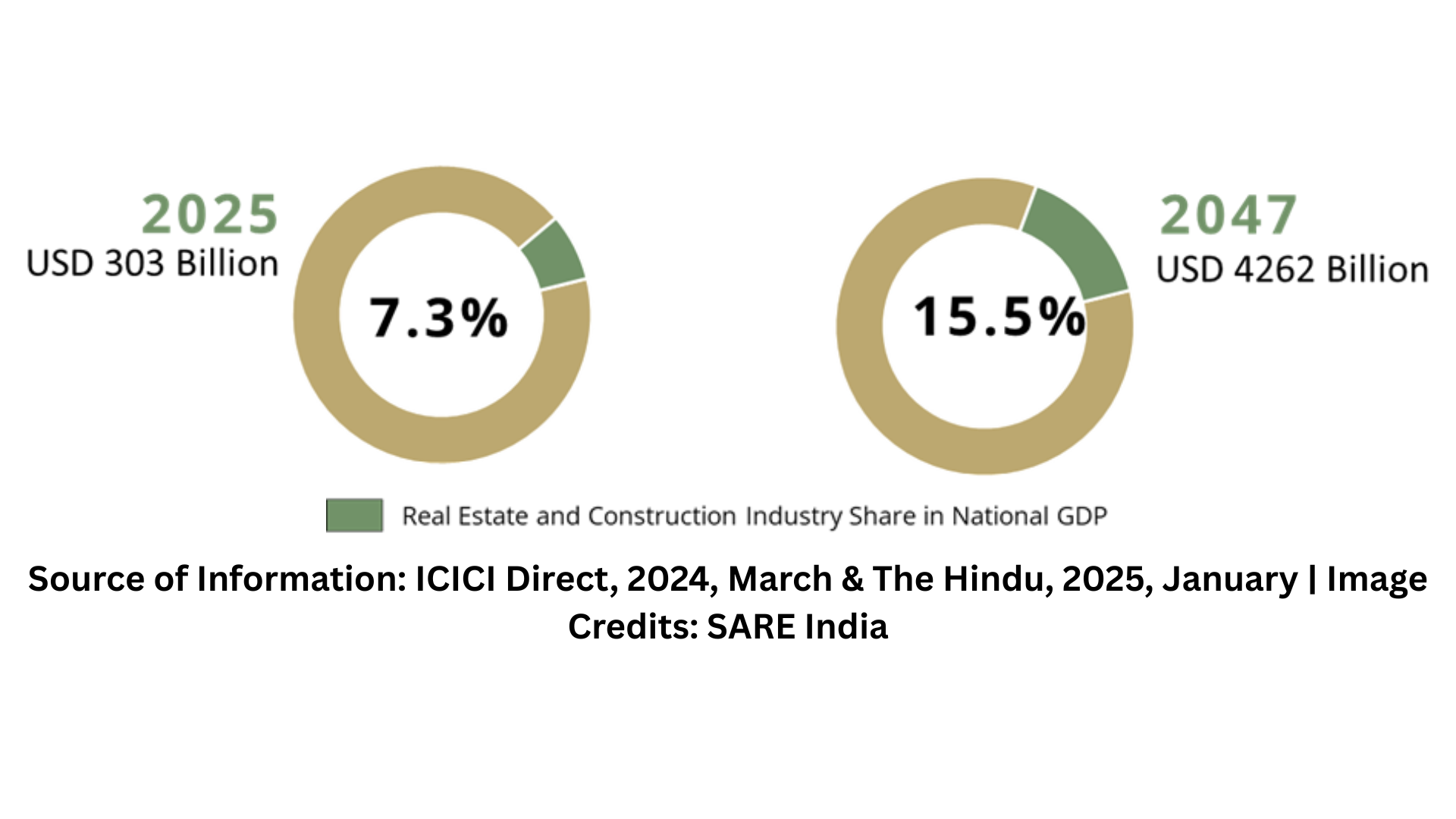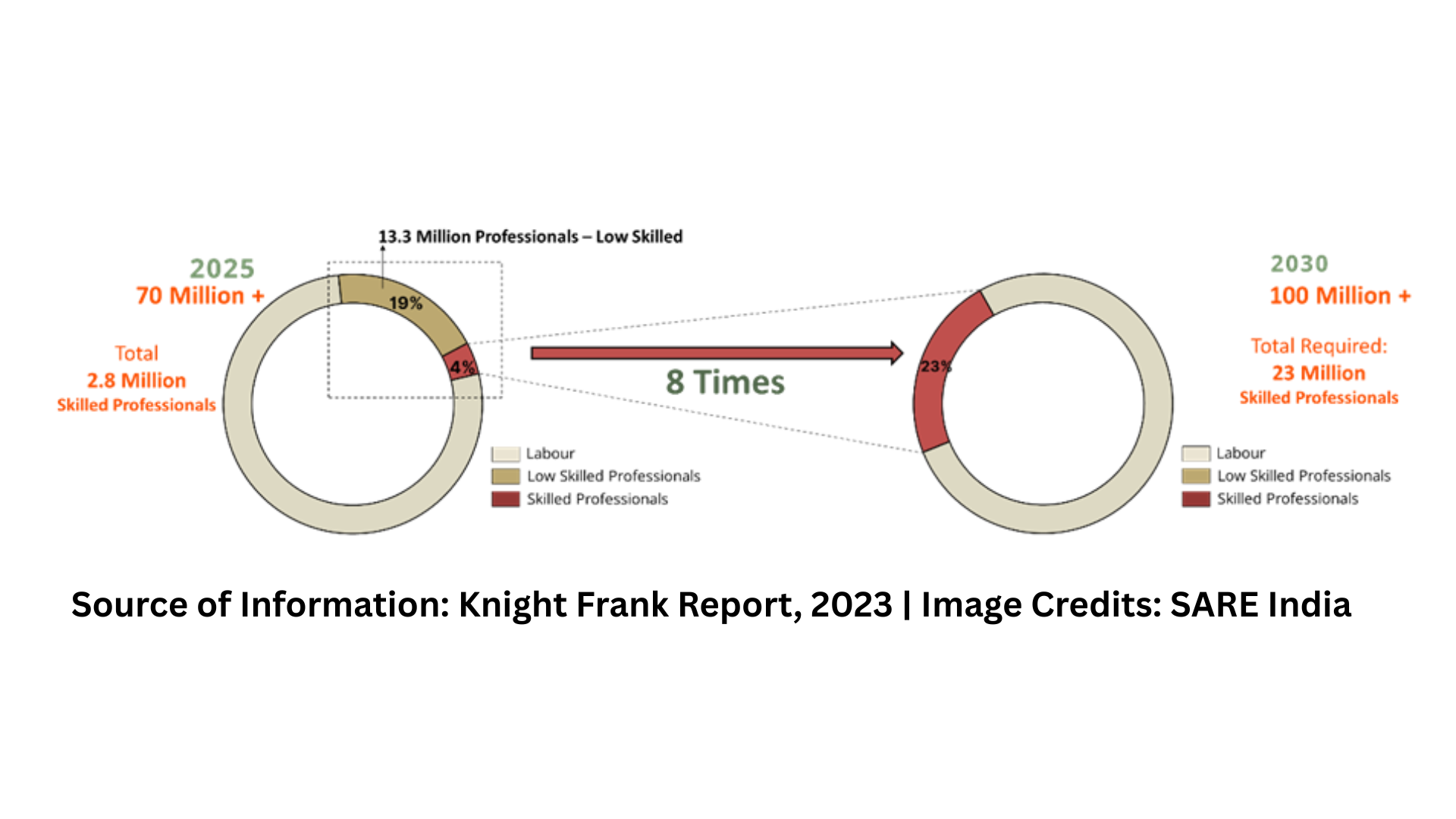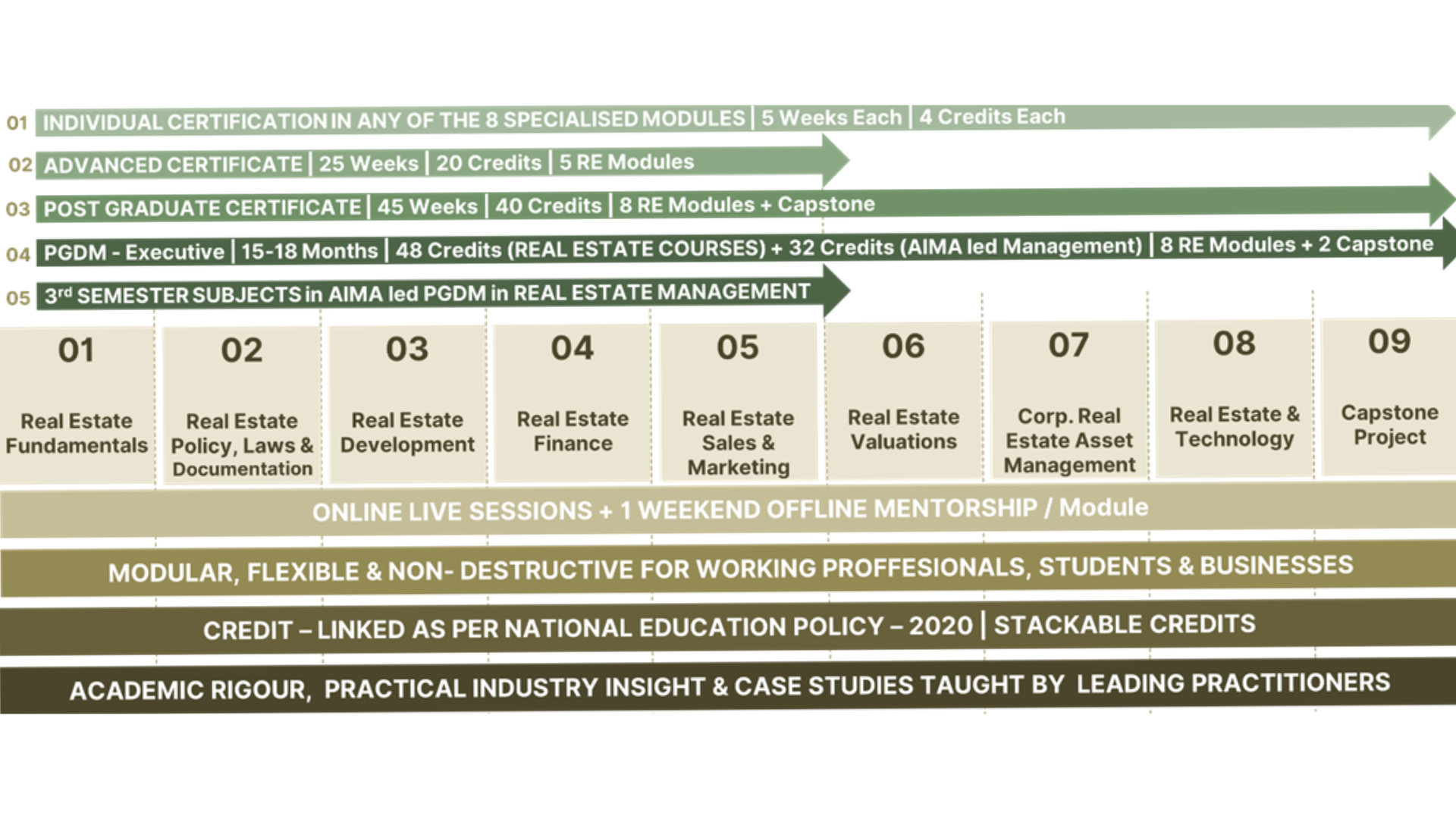Register at: www.sareindia.com
Background
India’s real estate and built environment sector is undergoing transformative growth, driven by rapid urbanisation, progressive regulatory reforms, technological advancement, and increasing global investment. While this growth has unlocked vast opportunities, it has also amplified a critical challenge — the acute shortage of professionally trained and industry-ready talent capable of navigating the sector’s evolving complexities.
To succeed in this dynamic landscape, professionals and aspiring entrants must continuously upskill and develop a holistic understanding of the multi-disciplinary dimensions that shape the real estate ecosystem.
Addressing this emerging talent gap, the All India Management Association (AIMA) — India’s apex body for management education — has partnered with SARE Built Environment Institute (SBEI) to offer specialised Real Estate Management programmes.
This collaboration combines AIMA’s academic leadership with SARE’s deep domain expertise to deliver AICTE-approved and industry-recognised programmes that are aligned with the National Education Policy (NEP). The programmes are structured, flexible, self-paced, and outcome-oriented — blending academic rigour with practical insights, contemporary case studies, and real-world application.
Learners can choose from a stackable pathway, ranging from a one-month certificate to a full Post Graduate Certificate & Diploma, with the flexibility to accumulate credits and earn certifications at their own pace.
Gap
1. Growth in India’s Built Environment sector
India’s Built Environment sector — spanning Real Estate, Infrastructure, Construction, and Building Materials — is at the forefront of national growth and transformation. As India moves toward becoming a USD 23–35 trillion economy by 2047, the built environment will be one of its strongest engines of progress.

For every ₹1 invested in real estate, ₹0.78 directly fuels India’s GDP — underlining the sector’s unmatched impact. Today, the real estate sector contributes over 7.3% (USD 305 billion) to India’s GDP (USD 4.19 trillion) and is projected to grow substantially toward USD 4,262 billion by 2047.

Skill Gap: Lack of Skilled Professional Workforce
India’s Built Environment sector is on the cusp of transformation, driven by rapid urbanisation, regulatory reforms, and investor interest. However, the industry continues to grapple with a shortage of skilled, future-ready professionals who can navigate complex regulations, structure innovative deals, and manage assets effectively.
The Real Estate industry and Construction Industry is India’s second-largest employer, engaging over 70 million professionals. This number is expected to cross 100 million by 2030.
Only 4% of the workforce possesses formal professional qualifications. However, this falls significantly short of the projected demand, i.e., an estimated 23 million skilled professionals who will be needed by 2030. This is nearly eight times of the current skilled workforce. No amount of formal classroom style education can fix this gap, and the only way forward is to have programmes that encourage- “Learn while you work”

Changing Dynamics: Learning while you work
Professionals in the built environment industry come from diverse background and often work in silos. This not only creates lack of coordination between teams, but also makes monitoring and control very complex, with no measures adopted by the teams to optimise resources. This results in increase of workforce as well. With the advent of technology:
- Education is shifting from classrooms to online.
- “Certification is replacing degrees”.
- Learners and employers need flexibility and customisation.
- Micro-credentials & skill-based education.
- Demand for short-term, industry-recognised certifications focusing on specific skills.
- Rising demand for cross-functional skill sets by employers.
- Digital disruption & AI integration across workflows.
While there is a clear gap between industry expectations and workforce readiness, organisations have limited access to flexible, customised, structured and interdisciplinary learning or up-skilling options.
This significant gap underscores the urgent need for a robust pipeline of skilled, certified, and industry-ready professionals capable of driving innovation, sustainability, and operational efficiency.
Addressing the Gap
The Real Estate Management programme by AIMA and SARE is designed to prepare professionals for this evolving landscape. The programme equips learners with the knowledge to plan, finance, and manage real estate assets, understand development trends, and leverage PropTech and sustainability-driven solutions. This programme will serve as a catalyst for the professionals ready to lead India's next decade of growth in Built – environment sector.
The real estate industry today is one of the most dynamic sectors of the economy — driving infrastructure, employment, and innovation across India’s cities and towns. Managing real estate requires more than just technical know-how; it demands strategic thinking, financial expertise, and an understanding of markets, policy, and technology.
From real estate fundamentals, finance and investment to marketing, valuations, policy, and management — the programme offers a holistic understanding of the built environment, enabling learners to lead with confidence in a fast-growing global industry.
This programme aims to equip individuals with the analytical, managerial, and leadership capabilities to navigate the evolving challenges of India’s real estate and infrastructure sectors.
Aims & Objectives
- To bridge the gap between academic learning and practical application in the real estate and built environment sectors.
- To deliver a structured, recognised, and industry-backed curriculum aligned with global best practices.
- To equip professionals with multi-disciplinary competencies in real estate including development, finance, marketing, asset management, policy, valuation, ESG, and technology.
- To offer career advancement opportunities through flexible and modular learning formats.
- To establish a national platform for continuous professional development in the built environment domain.
Assessment
- Continuous evaluation through class participation and assignments.
- End-term evaluation.
- Capstone project evaluation for the Post Graduate programme.
- Certificate by AIMA as Institutional Partner and SARE as Knowledge Partner upon successful completion.
Eligibility
- Graduates or working professionals in any discipline from a recognised university.
- Work experience of 1–2 years preferred.
- For PGDM (Executive), a minimum of 3 years of work experience is required.
Pedagogy
- Fundamental concepts reinforced through established theory and industry best practices.
- “Real Skills for Real World” approach: Practitioner-led learning through live industry projects and case studies.
- Applied assignments anchored in real-world challenges.
- Access to industry mentors and faculty for professional guidance and networking.
For Further Details, Please Contact:
Programme Structure & Delivery
Our Programme are offered in three progressive formats, designed for flexibility and career advancement based on the credit bank system:
- Certificate in Real Estate Management – Short-Term (4 Weeks)
- Professional Certificate in Real Estate Management – Intermediate (6 Months)
- Post Graduate Certificate in Real Estate Management – Advanced (11 Months)
- Post Graduate Diploma in Management – Executive (15 – 18 Months)
- AIMA led Post Graduate Diploma in Management with specialisation in Real Estate Management (24 Months)

Modules Offered
Each course is modular, stackable, and credit-based — allowing participants to build their learning progressively and receive recognition at every stage.
| Program | Course Duration (Weeks) | No. of Modules | Credits | No. of Sessions | Capstone Project | No. of Assignments | No. of Examinations | Instructional Hours | Mode of Delivery |
|---|---|---|---|---|---|---|---|---|---|
| Certificate in Real Estate Management | 04 | 01 | 04 | 07 | ✕ | 02 | 01 | 24 | Online + 1 weekend offline immersion |
| Advanced Certificate in Real Estate Management | 25 | 05 | 20 | 35 | ✕ | 10 | 05 | 120 | |
| PGCM in Real Estate Management | 45 | 08 | 40 | 56 | ✓ + 01 capstone |
16 | 08 | 192 | |
| PGDM – Executive in Real Estate Management | 60–72 | 08 | 48 (SARE) + 32 (AIMA) |
56 (02) |
✓ + 02 capstone |
16 | 08 | 384 | |
| AIMA-led PGDM (Specialised in Real Estate Management – 3rd Semester) | 25 | 05 | 20 | 35 | ✕ | 05 | 05 | 120 |
Mode of Delivery
- Blended Format: Online live sessions, recorded modules, and interactive workshops, along with periodic offline immersions in Delhi – NCR, Mumbai, Ahmedabad & Bangalore.
- Flexible Scheduling: Weekend and online classes (3 hours per day) thoughtfully designed for working professionals.
- Technology-enabled Learning: Access via an advanced Learning Management System (LMS) with continuous support and resources.
Course Credits, Duration & Fees
Aligned with the National Credit Framework (NCrF) under the National Education Policy (NEP) 2020, learners can accumulate and transfer credits across the programme levels within a course of 5 years.
| Programme | Duration | Credits | Fees (INR) |
|---|---|---|---|
| Certificate in Real Estate Management | 4 Months | 4 Credits per module | ₹30,000 + GST |
| Professional Certificate in Real Estate Management | 6 Months | 20 Credits | ₹1,36,000 + GST |
| Post Graduate Certificate in Real Estate Management | 12 Months | 40 Credits including capstone project | ₹2,40,000 |
| Post Graduate Diploma in Management (Executive) | 18 Months | 80 Credits including capstone project | ₹ 4,00,000 |
| Post Graduate Certificate in Management (PGDM) Specialisation-Real Estate Management | 24 Months | 102 Credits including capstone project | ₹2,50,000 |
Key Objectives
- Apply multidisciplinary learning to a real or simulated project.
- Demonstrate analytical, financial, and strategic decision-making.
- Develop professional project documentation and presentation skills.
- Engage with industry mentors for feedback and validation.
Outcome
A comprehensive project portfolio showcasing the participant’s capability to handle complex, real-world real estate challenges — serving as both an assessment and a career-ready credential.
